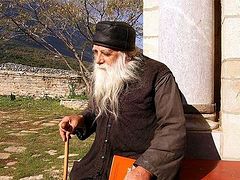A truly blessed work is not to sin: but having sinned, not to despair but to weep over wherein we sinned, that by tears we might again seize upon blessedness. Therefore, we ought to wonderfully and always pray, and not to faint, as the Lord says (Lk. 18:1). And the apostle also says, Pray without ceasing (1 Thess. 5:17)—that is, at night, and in the day, and at every hour—not just upon entering a church, but not abandoning care for it at other times as well; on the contrary, whether you are working, or sleeping, or on the road, or eating, or drinking, or lying down—do not interrupt prayer, for you do not know when they will come requiring your soul. Do not wait for Sunday or a feast day, do not dissect the difference in places, but, as said the prophet David, pray in every place of His dominion (Ps. 102:22). Therefore, whether you are in church, or at home, or in the fields, whether you are pasturing sheep, whether you are busy with construction, whether you are at a repast—do not forsake prayer; and when possible, on bended knee, and when not possible, pray with the mind, in the evening, and in the morning, and at noon.
If prayer precedes your work, and, having arisen from your bed, you devote your first movements to prayer, then sin will find no access to your soul. Prayer is a preservative for chastity, the training of the soul, the taming of arrogance, purification from remembrance of wrongs, the annihilation of hatred, and the correction of wickedness. Prayer is a fortress to the body, prosperity to a home, beautification to a city, might to a kingdom, a sign of victory in times of battle, and the strength of the world. Prayer is the mark of virginity, the fidelity of marriage, the weapon of travelers, the sentinel of those taking their rest, the good hope of the vigilant, the fertility of farmers, the salvation of those upon the waters. Prayer is the intercessor for the convicted, the consolation of the imprisoned, the comfort of the grieving, the merriment of the rejoicing, the reassurance of the weeping, the feast of birthdays, the crown of spouses, and interment of the departed.
Prayer is conversation with God, equal honor with the angels, success in the good, aversion to evil, and the correction of sinners. Prayer made the whale into a home for Jonah, it returned Hezekiah to life from the gates of death, and turned the flames into a wind of dew for the Babylonian youths (Dan. 3:50). By prayer Elijah bound up the heavens, and it rained not on the earth by the space of three years and six months (Jas. 5:17).
You see, brother, how powerful is prayer. In the whole life of man there is no treasure more precious than prayer. Never depart from it, never abandon it, but, as said our Lord, let us pray, and let our labor not be in vain (cf. Mt. 6:7). And when ye stand praying, forgive, if ye have ought against any: that your Father also Which is in heaven may forgive you your trespasses (Mk. 11:25). Take care, my beloveds, that you not labor in vain in prayer, if you have enmity against any. The Lord says further: Therefore if thou bring thy gift to the altar, and there rememberest that thy brother hath ought against thee; Leave there thy gift before the altar, and go thy way; first be reconciled to thy brother, and then come and offer thy gift (Mt. 5:23-24). Thus, it is clear now that if you do not do this aforetime, then anything you bring will not be accepted.
If you fulfill the Lord’s commandment, then with boldness pray to the Lord, saying, “Relinquish, my Lord, my debts, as I have relinquished my brother’s, fulfilling Thy command. Though I am weak, I nevertheless have relinquished.” And He Who lovest mankind will reply: “If thou hast relinquished, then I relinquish; if thou hast forgiven, I will forgive thee thy debts; because I have the power to loose sins on earth.” If you loosen, they will be loosened for you. You see the incomparable love of God for man. You see the limitless grace of God. You have heard a concise means of salvation for your souls.
Second Word
Prayer is a great weapon, an inexhaustible treasure, a richness never depleted, a tranquil landing, the foundation of stillness; prayer is the root, source, and mother of thousands of blessings. It is stronger than his kingdom itself. Therefore, it often happens that one endowed with a diadem suffers a fever, burning with fire lying on his bed, doctors, bodyguards, servants, captains standing before him: And neither the doctors’ art, nor the presence of friends, nor household amenities, nor the plethora of medicine, nor precious utensils, nor riches, nor any other human benefits are able to alleviate his malady; but if one comes possessing boldness before God and touches but the body, and says over him a pure prayer, then the whole bodily infirmity is banished. And what riches, a multitude of servants, experiential knowledge and the greatness of his kingdom were unable to do, often, the prayer of one indigent and poor is able to do.
I understand prayer not as something cold and wholly negligent, but as something extended, committed with pain of soul and a taut mind, for such prayer arises to Heaven. As water, when it flows along level ground and enjoys plenty of space does not rise to the heights, but when the hands of a plumber, having blocked its flow below, constrain it, and being constrained it flies upward faster than any arrow; so the human mind overflows and becomes dissipated while it enjoys great freedom; when circumstances constrain it, then pure and powerful prayers rise to the heights in this beautiful oppression. In order to understand why these prayers, said with sorrow, are especially heard, listen to what the prophet says to the Lord: In my distress I cried unto the Lord, and he heard me (Ps. 119:1).
Thus, let us stir up our conscience, to arouse in the soul the sorrow of the memory of sins; to arouse sorrow not to constrain the soul, but to make it worthy of being heard, and sober, and vigilant, and touching the very Heavens. Nothing so banishes from us indolence and negligence as a pained and sorrowful feeling which gathers the mind together and returns it to its very self. He who so mourns and prays, for him will a great sweetness settle into his heart after prayer . As a gathering of clouds at first makes the sky dark, but when rain falls from them and the clouds give up, one after the other, the snowflakes accumulated in them, then they again make the whole sky quiet and clear, so heartfelt sorrow, as long as it is trapped within, darkens our thoughts, but when it exhausts itself in words of prayer with tears and leaves us, then a great clarity is produced in the soul, sending down to the mind of him who prays, like some ray of light, the thought of Divine aid.
But what cold reasoning do many have? They say: “I have no boldness; I am covered with shame and cannot open my mouth.” This fear is satanic, and an excuse for this laziness; the devil wants to obstruct the door by which we can enter to God. Have you no boldness? Boldness is great, but the greatest is to regard yourself as having no boldness, because it is an extreme shame and condemnation to regard yourself as having boldness. If you have many merits but do not realize anything bad in yourself, but regard yourself as having boldness, then you deprive yourself of every fruit of prayer. And if you bear on your conscience innumerable burdens of sins, you will convince yourself only that you are the last of all, and then you will have great boldness before God.
There is no humility in this, for a sinner to consider himself a sinner, for humility consists in, recognizing in yourself much that is great, not to imagine anything great about yourself; humble is he who is like Paul and can say, For I know nothing by myself (1 Cor. 4:4), and can also say, Christ Jesus came into the world to save sinners; of whom I am chief (1 Tim. 1:15). Humility is to be high in merits, but to abase yourself in your mind. Nevertheless, God, in His effable benevolence, admits to Himself and accepts not only those who humble themselves, but also those who sincerely utter their sins; and to such He is merciful and condescending.
And in order to know what a blessing it is not to imagine anything great about yourself, inscribe in word two chariots. Harness righteousness and arrogance, and also sin and humility, and you will see that the chariot of sin precedes righteousness not by sin’s own power, but by the strength of one who has joined humility to it, and also the first chariot will be left behind, not by the infirmity of righteousness, but by the weight and girth of high-mindedness. For as humility, by its splendid heights, overcomes the weight of sin and sets the stage for the ascent to God, so high-mindedness, by the greatness of its weight and girth, is able to prevail over unencumbered righteousness and easily draw in downward.
And as testimony that one chariot is faster than the other, recall the Publican and the Pharisee. The pharisee harnessed righteousness and high-mindedness, saying, I thank thee, that I am not as other men are, extortioners, covetous, or even as this publican (Lk. 18:11). His high-mindedness did not saturate the entirety of human nature, but in great madness, he attacked the publican standing nearby. And what did the publican do? He did not repel the reproaches, did not confine himself to the charges, but gratefully accepted what was said, and the arrows of his enemy turned for him into treatment and healing, the reproaches into praise, and the accusations into a crown. How wonderful is humility!
So many benefits—to not wound others with slander, to not grow savage at the insults of others! For from them you can reap great and excellent blessings, as was with the publican. Having received the reproach, he laid aside his sins, and saying, God be merciful to me a sinner… he went down … justified … rather than the other (Lk. 18:13-14). Words became higher than deeds; a word took precedence over action. One flaunted his righteousness, fasts, and tithes, and the other uttered one word—and laid down all his sins, because God did not hear only the words, but saw the thought with which he spoke, and, finding humility and a contrite heart, pardoned him and showed His love for man.
I say this not so we might sin, but that we might be grateful. For the publican is a man standing on an extreme degree of injury, not by humility, but only by gratitude, by having spoken his sins, confessed that he is such—he drew upon himself God’s great favor; and those who, although they succeeded in great good deeds, nevertheless thought little of themselves, procured such help for themselves from God. Therefore, I exhort, ask, and entreat you to more often confess before God. I am not calling you to disgrace yourself before slaves like yourself; I do not require you to reveal your transgressions to men. Reveal your conscience before God, show Him your sores, entreat from Him healing, reveal yourself not to he who reproaches, but the He Who heals. For even were you to conceal them, He will find out all. Thus, speak in order to keep what you have acquired; speak so as to lay aside here your transgressions, to go there pure, and to free yourself from a future of insufferable reproof.
The three youths in the furnace, having brought their souls in confession to the Lord, with so many great merits, said, Now we cannot open our mouths; shame and reproach have come upon us, your servants (Dan. 3:33). Thus, for what do they open their mouths? In order to, they say, articulate this to us: Now we cannot open our mouths—and thereby attract the Master to themselves.
The strength of prayer quenched the strength of the flames, restrained the fury of the lions, resolved wars, ended battles, tamed the tempest, drove out demons, opened the gates of Heaven, dissolved the bonds of death, dispersed maladies, repelled attacks, restored faltering cities, halted blows inflicted from above and human slander: in a word—every calamity. And again, I understand prayer not just as lying upon the lips, but ascending from the depths of the mind. As trees that send roots into the depths of the earth, if they bear upon themselves the thousandfold attack of the winds, are not broken and cannot be uprooted because the roots are firmly fixed in the earth’s depths, so prayer that arises from the very depths of the mind is securely implanted, stretches to the heights, and no tempting thoughts can seduce it. Therefore, the prophet says, Out of the depths have I cried unto thee, O Lord (Ps. 129:1). Glory to Him unto the ages! Amen.




